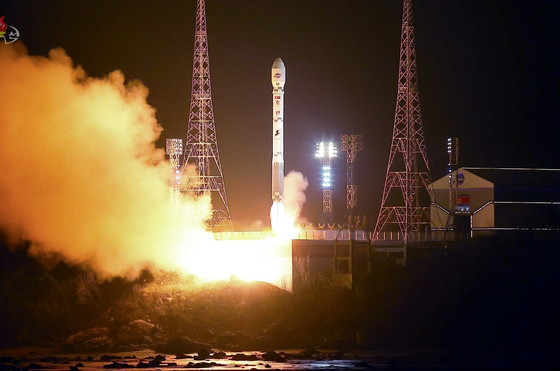North Korea said early Tuesday that an attempt to launch its latest spy satellite late Monday ended in failure after the first-stage rocket exploded midair.
The rocket carrying its satellite, Malligyong-1, exploded during the first-stage flight Monday night shortly after takeoff from the Sohae launching station on its west coast, reported the North’s state-run Korean Central News Agency (KCNA).
This marks the North’s third failed attempt to put a spy satellite into orbit.
Pyongyang acknowledged its failure at 12:22 a.m. Tuesday, soon after South Korea’s military said it had detected North Korea’s attempt to put a purported military reconnaissance satellite into orbit.

The South’s Joint Chiefs of Staff (JCS) said a projectile was launched in a southward direction over the Yellow Sea from the North’s northwestern Tongchang-ri area at about 10:44 p.m. Monday.
It said that around 10:46 p.m., many pieces of debris was found in the country’s waters, assessing that the rocket carrying the satellite exploded midair shortly after takeoff. The JCS said that a detailed analysis is underway between South Korean and U.S. intelligence authorities about the projectile’s trajectory.
The rocket flew southwest over waters between the Korean Peninsula and China, a similar trajectory North Korea had used in its previous satellite launches.
The KCNA on Tuesday quoted an aerospace administration official as attributing the accident to the operational reliability of a new “liquid oxygen plus petroleum” engine, after a preliminary examination by experts. It will be reviewing other causes for the explosion.
North Korea’s latest satellite launch came on the same day South Korean President Yoon Suk Yeol, Japanese Prime Minister Fumio Kishida and Chinese Premier Li Qiang held a trilateral summit in Seoul, the first of its kind in over four years.
The leaders in their joint declaration reaffirmed their commitment to promote peace and stability on the Korean Peninsula.
During the three-way summit, Yoon and Kishida called on Pyongyang to cease from carrying out a satellite launch, citing that it would be in violation of UN Security Council resolutions that ban the country from using such ballistic missile technology.
Early Monday, North Korea notified Japan of its plan to launch a satellite sometime before June 4. It had designated three areas for the rocket debris to fall, as a safety precaution.
On the same day, South Korea’s Air Force conducted aerial drills involving 20 fighter jets, including F-35As, near the inter-Korean border to demonstrate its resolve to punish any enemy provocation in response to the North’s launch plans.
The launch came on the first day of the eight-day window.
South Korea’s presidential office said late Monday that the National Security Office immediately reported the North’s latest satellite launch to the president after the military detected it and held a meeting to assess the situation.
Participants at the meeting led by National Security Adviser Chang Ho-jin said North Korea’s latest launch of a military spy satellite, which comes despite repeated warnings from the South Korean government and the international community, “is a violation of UN Security Council resolutions regardless of whether it is successful or not.”
They condemned it as a “provocative act that threatens the peace and security of the Korean Peninsula, Northeast Asia and the international community,” said the presidential office.
Pyongyang successfully put its first military spy satellite into orbit in November last year.
It came after two previous unsuccessful attempts last May and August.
North Korean leader Kim Jong-un said he wants to see three additional satellites launched this year at a meeting with the ruling Workers’ Party officials in December.
BY SARAH KIM [kim.sarah@joongang.co.kr]





